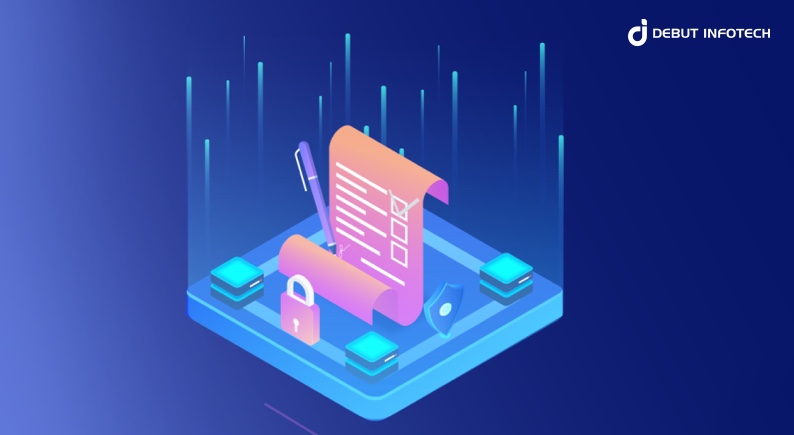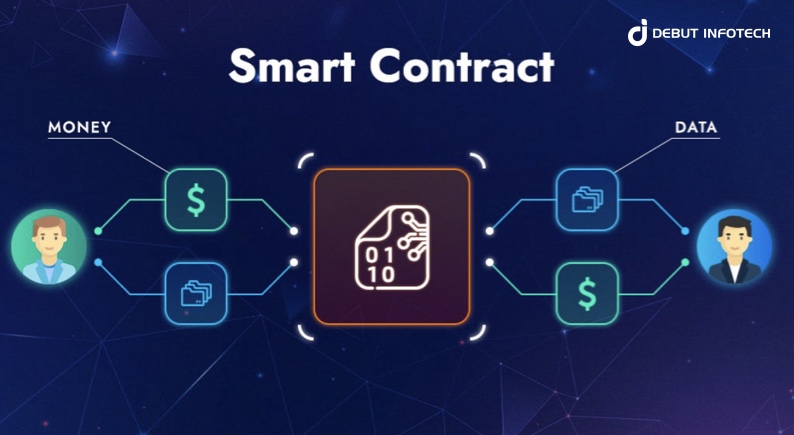Table of Contents
Home / Blog / Blockchain
The Role of Smart Contracts in Modern Blockchain App Development
May 30, 2024

May 30, 2024
Smart contracts transformed the blockchain scene by introducing an important fundamental change in the approaches to envisioning and executing agreements. Ethereum offered smart contracts to guarantee the development of programs on blockchain networks, which marked the beginning of the application of smart contracts in blockchain app development services. Smart contracts enabled the development of dApps for a wide range of use cases, expanding the use cases of blockchain technology beyond decentralized financial transactions.
Numerous platforms with special features and capabilities that can host smart contracts on blockchain have surfaced in recent years. The blockchain’s interaction with smart contracts has aided in fostering innovation in the web3 and blockchain spaces. Let’s investigate the impact of smart contracts on blockchain app development services in more detail.
The Meaning and Origin of Smart Contracts
Smart contracts are self-executing agreements that have the provisions of the contract encoded directly into the code. To ensure transparency and immutability, this code is saved and duplicated throughout a decentralized blockchain network. Secure and trustless transactions are made possible by the contract’s automatic enforcement upon the fulfillment of predefined conditions. Driven by breakthroughs in blockchain technology, smart contracts have come a long way from their first proposal by computer scientist Nick Szabo in the 1990s.
Nick Szabo first proposed the idea of self-executing contracts encoded in computer code in his groundbreaking work from 1994. This is where the concept of smart contracts originated. However, smart contracts did not become widely known or used until the emergence of blockchain technology, particularly with Vitalik Buterin’s 2015 launch of Ethereum. Ethereum’s programmable blockchain ushered in a new era of digital agreements and automated transactions by enabling developers to construct DApps and implement smart contracts.
How Do Smart Contracts Work?

In essence, smart contracts are the automated, digital equivalents of conventional legal contracts. They use software code to automate and carry out an agreement’s specified terms and conditions. These contracts are impenetrable because they are coded and kept on a transparent, safe, decentralized blockchain network.
Smart contracts work as self-governing programs that take action when certain criteria are satisfied. Take a look at a blockchain application for the supply chain. A smart contract may be used to automatically initiate payment upon receiving a delivery confirmation, removing the need for human interaction or outside mediation.
It’s interesting to note that using smart contracts significantly lowers the need for conventional middlemen like banks or attorneys, lowering the risks of fraud, mistakes, or non-compliance. These smart contracts gained popularity thanks in large part to Ethereum’s blockchain technology, which provided a stable foundation for their creation and implementation in a variety of sectors, including supply chain management, real estate, and finance.
The uniform replication of smart contracts across blockchain network nodes and their deterministic nature ensure transparent and synchronized agreement implementation for all parties involved. Notwithstanding the many benefits, it’s important to keep in mind that due to smart contracts’ immutability, extensive testing and auditing of the code are necessary before deployment to ward off potential flaws or vulnerabilities.
Why are Smart Contracts Important for Blockchain?
Blockchain is a cutting-edge technology that is significantly influencing how finance is being transformed. By doing away with middlemen and fostering peer-to-peer exchanges, smart contracts contribute to the wider application of blockchain technology. The capacity of smart contracts to create secure systems and bring transparency to blockchain transactions is the main emphasis of the examination of their position in the blockchain.
After being registered on the network, a smart contract is permanently recorded with the guarantee of inherent immutability. Furthermore, safety against assaults on single points of failure is guaranteed by the decentralization of smart contracts. It also guarantees independence from worries about system outages brought on by security problems.
How Do Smart Contracts Work in Blockchain Development?

Smart contracts use self-executing code in contrast to traditional contracts. Digital contracts are designed to automatically carry out predetermined activities when specific circumstances are met. Smart contracts’ automation guarantees that the development process is streamlined while also lowering the possibility of disagreements and mistakes.
Smart contracts have the potential to significantly change blockchain technology and make it more dependable and efficient. After being implemented, smart contracts can function independently without the need for middlemen. The elimination of needless delays connected with traditional contract enforcement is one of the main benefits of developing smart contracts on the blockchain. Furthermore, smart contracts only carry out the intended transactions when certain requirements are met. As a result, they can offer a safe and untrustworthy foundation for every individual engaged in the deal.
How Can You Use Smart Contracts in Blockchain Development?
Smart contracts are fundamental to the blockchain because of their advantages for increasing productivity, automation, and security in an enterprise blockchain app development company. By being aware of how smart contracts are applied in various industries, you may better comprehend their function in blockchain technology. Smart contracts, for instance, have the potential to improve payment speed and expedite banking procedures in the financial services industry. By doing away with middlemen, smart contracts can facilitate automatic financial transfers and smooth loan disbursements.
The interaction between blockchain technology and smart contracts can potentially impact supply chain management by enhancing transparency and traceability. In addition to assuring a decrease in errors, smart contracts can assist with the automation and authentication of each step in the supply chain. Smart contracts have the potential to provide safe and interoperable patient data sharing in the healthcare industry.
Smart contracts can improve the management of medical records by automatically granting access to patient consent in a matter of seconds. Smart contracts can also be used in blockchain development to support advantageous real estate use cases. Real estate transactions are made easier and more secure by smart contracts, which also help to avoid delays and conflicts.
The Role of Smart Contracts in Blockchain App Development
Smart contracts are electronic protocols that are kept on a blockchain and are intended to facilitate, confirm, and carry out the conditions of a contract automatically. With their built-in automation features, smart contracts—the lifeblood of blockchain technology—revolutionize the idea of contracts altogether.
The system gains autonomy with the establishment and deployment of smart contract terms on the blockchain. When criteria are met, the contract automatically carries out specified provisions. This essential characteristic distinguishes smart contract leagues from their conventional counterparts, which can be expensive, time-consuming, and prone to manipulation. In contrast, once implemented, smart contracts cannot be changed, guaranteeing that the terms of the contract are upheld even in the absence of a reliable third party, hence lowering the likelihood of fraud and disputes.
Understanding blockchain systems, programming languages, and the legalese of contracts are necessary for creating smart contracts. In order to ensure that the code correctly reflects the contractual conditions and functions flawlessly within the current blockchain ecosystem, blockchain experts with expertise in designing smart contracts are essential to this process.
Blockchain platforms specifically created for smart contract execution, such as Ethereum, are popular options for implementing smart contracts. Developers may now choose from a variety of platforms to suit their individual requirements, which is paving the way for smart contracts to become a crucial part of digital contracts and influence future industry-wide transactions.
Debut Infotech – Your Ideal Blockchain Development Company
Debut Infotech is a leading Blockchain App Development company that provides end-to-end blockchain services to its clients globally. With a team of highly skilled blockchain developers and smart contract experts, we offer comprehensive solutions tailored to meet the unique requirements of businesses across various industries. At Debut Infotech, we understand the pivotal role that smart contracts play in blockchain development. These self-executing contracts automate and enforce agreements, ensuring transparency, security, and efficiency in business processes.
Our dedicated R&D team stays updated with the latest advancements in smart contract technology, enabling us to deliver innovative solutions to our clients. Whether it’s developing decentralized applications, creating custom smart contracts, or integrating existing systems with blockchain technology, Debut Infotech is equipped to handle all your business requirements. Our expertise in blockchain development combined with our commitment to delivering exceptional results makes us the ideal choice for businesses looking to harness the power of smart contracts in their blockchain endeavors.
Conclusion
Given that they initiated the trend of blockchain programming, smart contracts play a crucial role in the evolution of blockchain technology. Smart contracts have enabled blockchain to become a significant player in the web3 space. Because of smart contracts’ efficiency, security, and automation features, you may design blockchain solutions specifically for novel use cases.
You will discover how smart contracts may foster creativity as you explore new use cases in various sectors. Additionally, smart contracts are useful tools for laying the groundwork for the development of web3 and are the basis for the creation of new assets like NFTs.
Frequently Asked Questions
A smart contract is a self-executing contract with the terms of the agreement directly written into lines of code. It automatically enforces and executes the terms of the contract when predefined conditions are met.
Smart contracts run on blockchain networks, ensuring that the contract’s code is immutable and transparent. When specified conditions are met, the contract self-executes, eliminating the need for intermediaries and reducing the risk of fraud.
Smart contracts offer several benefits, including automation, transparency, security, and cost-efficiency. They streamline processes, reduce the need for third parties, and minimize the potential for human error or tampering.
Generally, smart contracts are immutable once deployed to the blockchain. However, developers can design upgradable smart contracts using proxy patterns or other methods to allow for updates and improvements.
Smart contracts are used in various applications such as decentralized finance (DeFi), supply chain management, voting systems, insurance, real estate transactions, and digital identity verification.
Yes, smart contracts are vulnerable to coding errors and security flaws. If a smart contract contains bugs, it can be exploited, leading to significant financial losses. Thorough testing and security audits are essential to mitigate these risks.
Several blockchain platforms support smart contract development, including Ethereum, Binance Smart Chain, Solana, Polkadot, and Cardano. Ethereum is the most widely used platform for smart contracts.
Talk With Our Expert
Our Latest Insights
USA
2102 Linden LN, Palatine, IL 60067
+1-708-515-4004
info@debutinfotech.com
UK
Debut Infotech Pvt Ltd
7 Pound Close, Yarnton, Oxfordshire, OX51QG
+44-770-304-0079
info@debutinfotech.com
Canada
Debut Infotech Pvt Ltd
326 Parkvale Drive, Kitchener, ON N2R1Y7
+1-708-515-4004
info@debutinfotech.com
INDIA
Debut Infotech Pvt Ltd
Sector 101-A, Plot No: I-42, IT City Rd, JLPL Industrial Area, Mohali, PB 140306
9888402396
info@debutinfotech.com




Leave a Comment